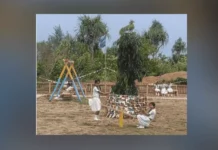The Khelo India banner moved from stadium tracks to shoreline sand on Monday as Union sports minister Mansukh Mandaviya declared the inaugural Khelo India Beach Games open on Diu’s Ghoghla Beach, a Blue-Flag certified stretch chosen for its clean water and rescue infrastructure. More than 1,350 athletes representing 30 states and Union territories marched behind their flags, signalling India’s intent to grow a professional beach-sport circuit that matches its continental ambitions.
The ceremony blended local colour, Garba dancers in mirror-work ghagras, with Olympic-style pageantry: a relay flame, the national anthem and a mass sand-art tableau spelling out Khelo India. Among the dignitaries were Andaman and Nicobar lieutenant-governor D K Joshi, Islands Development Agency vice-chairman; Puducherry’s administrator Kuniyil Kailashnathan; and Dadra-Daman-Lakshadweep administrator Praful K Patel.
Officials said the Games will unfold in eight disciplines, beach soccer, volleyball, kabaddi, handball, wrestling, athletics, weightlifting and a water-kayak sprint, over five days, supported by nearly 200 technical officials and lifeguards. Events begin at 06:30 to beat the glare, then resume under floodlights after sunset to woo local spectators and tourist footfalls.
Joshi, who heads a UT that fields medal-hopefuls in beach volleyball and kayak, used his address to remind athletes that the Diu event fulfils an idea first aired in Prime Minister Narendra Modi’s Mann Ki Baat radio episode last month: proof that determination can trump geography when land-locked states like Haryana and Rajasthan raise teams for sand sport. He also credited the Daman-Diu administration for rapid tourism upgrades, boardwalks, changing rooms, solar-lit promenades, that now double as sporting infrastructure.
Mandaviya’s ministry underwrote most of the ₹28-crore budget, while the local administration handled venue readiness and athlete housing inside re-purposed coastal police barracks. Beach-friendly flooring, modular bleachers and zero-plastic protocols mark a template likely to roll out at other Blue-Flag beaches if the pilot attracts sponsors. Early signs are positive: two beverage brands and a footwear company have signed on for on-ground activations; Doordarshan and the Khelo India app are streaming finals live.
Performance stakes are high for Andaman-Nicobar, which has sent 45 athletes, its largest external contingent in a single Khelo India event. Coaches point to beach kabaddi and kayak sprint as medal prospects, citing year-round training in comparable sand and current conditions. A medal table breakthrough could boost the archipelago’s argument for dedicated funds to upgrade its limited open-water training lanes.
Organisers face a short weather window. Southwest monsoon advances early on this coast, and meteorological advisors have set 24 May as a hard stop. Contingency schedules allow for compressing knockout stages if high winds breach safety thresholds. For now, sea conditions hover at a moderate one-metre swell, well within the red-flag trigger of 1.8 metres.
The proof of concept rests on two questions: Can India grow a calendar of ticketed beach events that sustain local economies, and can Khelo India’s school-based pipeline adapt to sand surfaces that demand different biomechanics? Stakeholders will revisit those questions when the final whistle blows on Friday. For now, the waves at Ghoghla crash to a new beat, one set by whistle blows, drum rolls and the cheers of athletes determined to carve podium finishes on shifting sand.





